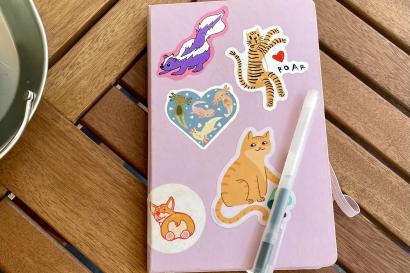As I sit here at my gate in JFK, I’m surprised by the stillness of my body and mind. The craziness of this past week — making to-do lists, shopping lists, packing, saying goodbye to my friends and family, weighing my suitcases and then re-packing — had all led up to this: a few hours of waiting, silently and alone, before I board my flight.
For the past few weeks since finding out I had been accepted to IES’ summer internship program in Barcelona, my mind has been a whirlwind of nonstop imagination and wonders, planning out all the things I would do, people I’d meet, and experiences I would surely have. I even planned out a little morning routine for myself: wake up at 8 am, hit the gym by 8:15, eat breakfast at 9:30, shower at 9:45, be on my way to work by 10:15…. Overthinking and planning are my ways of maintaining control over situations, but as I sit here at my gate, watching as the hundreds of boarding times appear and then disappear rhythmically on the large monitors before me, I’m beginning to realize how futile it all might be. The truth is, I have no idea where these next two months will take me, how I’ll get along with the people I’ll meet, or if I’ll even have time in my day for the morning routine I planned out for myself. How could I? Everything I have always known is about to change, about to be replaced with something new.
Thinking of this, I’m reminded of an essay still fresh in my mind: The Crane Wife by C.J. Hauser. I had read this article a few years ago, and re-discovered it a week prior when a friend texted me the link. It’s an article about the author, who ten days after calling off her engagement finds herself on an expedition studying whooping cranes. It’s an article about many things, including how we reckon with our needs and adapt to change. At one point, Hauser writes:
"Here is what I learned once I began studying whopping cranes: only a small part of studying them has anything to do with the birds. Instead we counted berries. Counted crabs. Measured water salinity. Stood in the mud. Measured the speed of the wind.
It turns out, if you want to save a species, you don’t spend your time staring at the bird you want to save. You look at the things it relies on to live instead. You ask if there is enough to eat and drink. You ask if there is a safe place to sleep. Is there enough here to survive?" [1]
While standalone, Hauser’s observations on the whooping cranes also serve as an analogy for needs in interpersonal relationships, alluding to the importance of the minute and the implicit as opposed to the obvious and surface-level. I can extend this to how I imagine life in Barcelona to be: just as studying the whooping cranes requires looking beyond the birds themselves, thriving in a new country means focusing on the deeper, hidden necessities. The extent of my enjoyment of my time abroad won’t hinge on adhering to a meticulously planned routine or predicting every outcome. It’ll depend on my ability to adapt to new circumstances, embrace the unexpected, and find the resources I need to flourish. Besides, isn’t the point of going abroad to live through something new? To be present in the moment and open to the experiences that come my way, instead of trying to control every aspect.
My boarding time draws nearer by the minute, and the solitude allows for contemplation and thought. I try to let go of my rigid plans and embrace the unknown. Barcelona will offer its own rhythm, its own opportunities, its own lessons. And much like the cranes, I think I’ll find my own way by paying attention to the world around me, seeking out what I need not just to survive, but truly live.
[1] Hauser, CJ. “The Crane Wife.” The Paris Review, 19 Aug. 2019, www.theparisreview.org/blog/2019/07/16/the-crane-wife/.

Natalie Peña-Galvis
Hey! My name's Natalie and I'm from Brooklyn, New York. I'm studying English and Ad & PR at the University of North Carolina at Chapel Hill. On my free time, I love to read, do yoga, and go for walks outdoors.








